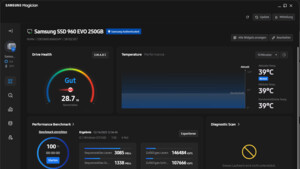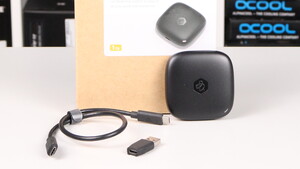A
askling
Gast
Es ist irgendwie ein Aluhut-Thema was mich nicht loslässt.
Enterprise-SSDs haben Kondensatoren für PLP. Consumer SSDs haben meist eine Firmware-Lösung, die nur zum Teil hilft.
Bei der MX500 z.B.
Micron's partial power loss protection feature for data at rest is preserved, but implemented in a different fashion; they're now also branding it as "power loss immunity". The impact is still the same: you don't get the full protection that is standard for enterprise SSDs, but data that has already been written to the flash will not be corrupted if the drive loses power while writing a second pass of more data to the same cells.
https://www.anandtech.com/show/12165/the-crucial-mx500-1tb-ssd-review
Bei Samsungs Evo 860 Evo habe ich bisher nichts dazu gefunden, ich vermute aber stark das es dort was ähnliches wie bei der MX500 gibt, denn die Samsungs waren da ja nie auffällig (im Gegensatz zu anderen SSDs). Wer Infos dazu hat gerne posten!
Ich Frage mich jetzt, ob HDDs, wie z.B. die WD Red, in diesem Punkt (Powerloss) überhaupt robuster als gute aktuelle consumer SSDs wie die mx500 oder 860 EVO sind?
Oder gab es diese Gefahren schon immer bei consumer Storage, waren aber nicht so im Fokus wie jetzt bei SSDs.
Enterprise-SSDs haben Kondensatoren für PLP. Consumer SSDs haben meist eine Firmware-Lösung, die nur zum Teil hilft.
Bei der MX500 z.B.
Micron's partial power loss protection feature for data at rest is preserved, but implemented in a different fashion; they're now also branding it as "power loss immunity". The impact is still the same: you don't get the full protection that is standard for enterprise SSDs, but data that has already been written to the flash will not be corrupted if the drive loses power while writing a second pass of more data to the same cells.
https://www.anandtech.com/show/12165/the-crucial-mx500-1tb-ssd-review
Bei Samsungs Evo 860 Evo habe ich bisher nichts dazu gefunden, ich vermute aber stark das es dort was ähnliches wie bei der MX500 gibt, denn die Samsungs waren da ja nie auffällig (im Gegensatz zu anderen SSDs). Wer Infos dazu hat gerne posten!
Ich Frage mich jetzt, ob HDDs, wie z.B. die WD Red, in diesem Punkt (Powerloss) überhaupt robuster als gute aktuelle consumer SSDs wie die mx500 oder 860 EVO sind?
Oder gab es diese Gefahren schon immer bei consumer Storage, waren aber nicht so im Fokus wie jetzt bei SSDs.



